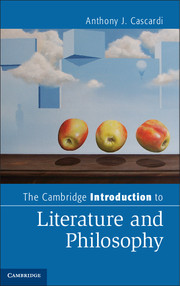Book contents
- Frontmatter
- Contents
- Acknowledgments
- Introduction
- Part I Questions of Truth and Knowledge
- Part II Questions of Value
- Part III Questions of Form
- Chapter 9 Ubiquitous Form
- Chapter 10 Linguistic Turns
- Chapter 11 Form, Narrative, Novel
- Chapter 12 Forms and Fragments
- Afterword Limits
- Glossary of Keywords
- Notes
- Index
- References
Chapter 11 - Form, Narrative, Novel
Published online by Cambridge University Press: 05 June 2014
- Frontmatter
- Contents
- Acknowledgments
- Introduction
- Part I Questions of Truth and Knowledge
- Part II Questions of Value
- Part III Questions of Form
- Chapter 9 Ubiquitous Form
- Chapter 10 Linguistic Turns
- Chapter 11 Form, Narrative, Novel
- Chapter 12 Forms and Fragments
- Afterword Limits
- Glossary of Keywords
- Notes
- Index
- References
Summary
In this chapter, I turn to the place of narrative in the relations between “deep” and “surface” structures. Our working hypothesis will be a strong one: that narrative is not just a form that is laid over neutral content, but is itself both an epistemological category and an ethical/moral one. It orders knowledge and value according to the elements of time and action that are basic to experience itself. Proponents of the strong view of narrative would say that narrative is basic to questions of truth and value because cognition and morality are themselves narratively structured. On this view, the Kantian categories of space and time are not sufficient to capture what is fundamental about experience because they leave narrative out.
There would be little reason to think of narrative as integral to questions of truth and value if one were to believe, as a philosopher like Kant did, that pure reason determines what we know and that morality is a matter of obedience and respect toward a categorical imperative. Indeed, Kant found narrative a useful but insufficient way to fathom the idea of human progress toward the good. Kant took up the question in the essays “An Old Question Raised Again: Is the Human Race Constantly Progressing?” and “Idea for a Universal History,” and his review of Herder’s Ideas for a Philosophy of History of Mankind. In these writings, Kant drew on the story-like form of history in order to explain how we could discern the shape of human history as a whole without in fact being able to see the end of it. His reasoning was formal rather than grounded in evidence drawn from particular moments in society or other empirical sources. Kant wished to assert that human history has a purpose and a goal (teleology) that lead toward the good. Though we cannot know with absolute certainty where we stand with respect to progress, we can nonetheless posit it as a complete narrative, and we can place ourselves in relation to it as we might in relation to some “as if” story. We are “inside” the story of progress, although we also need to stand “outside” in order to grasp it as a whole.
- Type
- Chapter
- Information
- The Cambridge Introduction to Literature and Philosophy , pp. 155 - 167Publisher: Cambridge University PressPrint publication year: 2014



